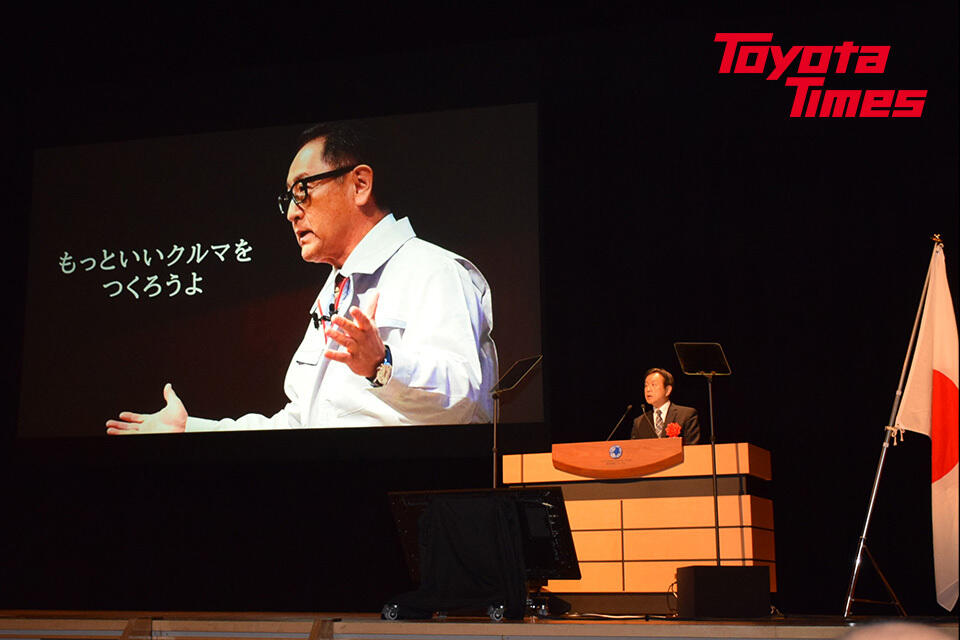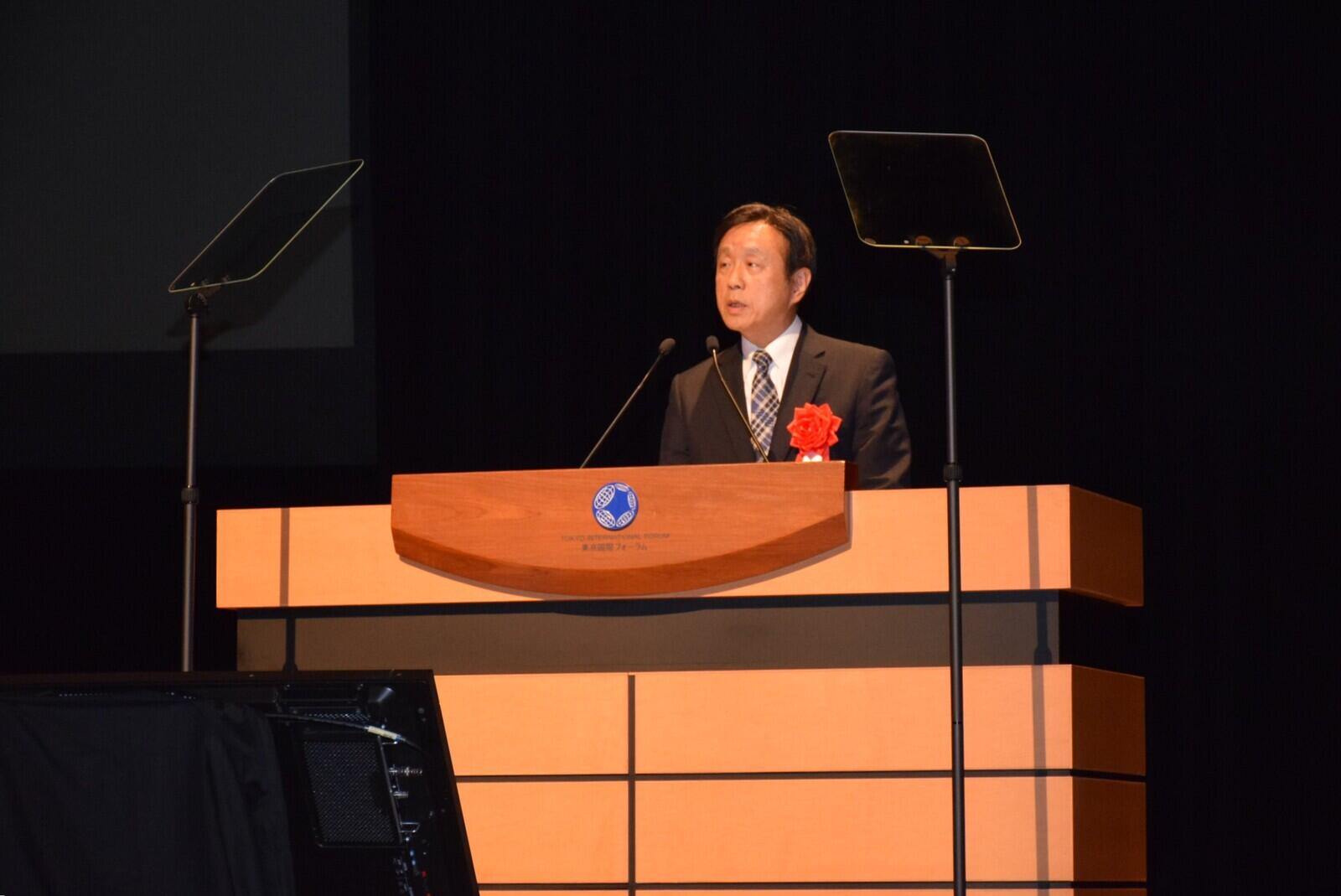
Offender rehabilitation in Japan has flourished through the altruistic spirit and humanity of volunteers. In a speech commemorating the system's 75th anniversary, Toyota Vice Chairman Shigeru Hayakawa recounted how Akio Toyoda transformed the company by "getting people to engage with each other."
Ever-better carmaking

The fall into the red and the global recall problem were followed by the Great East Japan Earthquake, floods in Thailand, and a super-strong yen.
As he steered Toyota through this series of crises, then-President Toyoda continued to emphasize one thing: “Let’s make ever-better cars.” At the same time, he put his own life on the line as a test driver.
Chairman Akio says he “could think of no other way to turn Toyota around,” yet to me, this embodies his conviction as a carmaker and his deep-rooted sense of purpose as the grandson of company founder Kiichiro Toyoda.
When Akio Toyoda joined the Toyota Motor Corporation, his father, Shoichiro Toyoda, was serving as the company’s president. He told Akio:
“No one at Toyota will want you working under them.”
Indeed, this was precisely the case. Toyota employees wanted nothing to do with him, and Akio Toyoda found himself treated as an untouchable presence.
Through this experience, Chairman Akio says he learned how to make others see him as an individual rather than a member of the founding family.
He did so by presenting his true self, without pretense, laying bare both his strengths and his shortcomings.
Akio Toyoda wanted to show that, although he was part of the Toyoda family, he was first and foremost a member of the larger family, which was Toyota Motor Corporation.
As president, he became more aware of the extent of his personal influence. He explains his approach:
“Correct information would never reach me, particularly if it was inconvenient. I, therefore, had no choice but to go out to the genba, listen to people on the ground, and show that I was there to figure things out together and take action. For me, ‘top down’ means top management coming down to the front lines.”
These efforts resonated with people, and gradually, the number who were eager to work with him grew.
The changes began to manifest themselves through Toyota’s products.
They breathed new life into long-sellers like the Crown and Corolla, and revived sports cars such as the 86, Supra, and GR Yaris.
Toyota also put effort into work and commercial vehicles.
Our full lineup ranges from hybrids to battery EVs and hydrogen vehicles.
As you are all aware, right now, we face the tremendous challenge of achieving carbon neutrality.
Energy situations vary widely across the world, with many regions lacking sufficient electricity infrastructure and countless people relying on their cars as a lifeline.
As Chairman Akio says, “All of them are our customers, and they all face different realities. We want to ensure no one is left behind and provide ‘Mobility for All.’ Our enemy is carbon, not the internal combustion engine. That’s why we must explore the potential of every technology.”
Please watch this video.
“Let’s make ever-better cars.” When they first heard these words, Toyota employees would inevitably ask the president what he looked for in a good car.
His response was always the same.
“First, I want you to make something that you would consider a good car. Once you've done that, let’s take it for a drive and think about what would make it better.”
Reflecting on that period, Chairman Akio says:
“At that point, if I had offered them some kind of vision for making ever-better cars, I don’t think we would have the Toyota of today. I believe that individual genba personnel, thinking and acting on their own initiative, are responsible for creating this diverse product lineup that offers customers what they need.”
Akio Toyoda’s pursuit of ever-better carmaking no doubt began as a lonely journey.
Since then, it has spread to motorsports, decarbonization, wide-ranging partnerships, and the world.
In time, I believe it will lead us to a future that only carmakers can create.
Developing personnel
Alongside ever-better carmaking, Akio Toyoda has also dedicated himself to developing personnel.
In engaging with employees, Akio Toyoda offered his full and true self, giving everything he had. He laughed with them, shed tears with them, and scolded in earnest when they did wrong.
At Toyota, employees and management operate with a shared conviction: the company seeks happiness for its employees, and employees desire growth for the company. Together, both strive to protect jobs as the utmost priority.
These principles are rooted in the bitter experience of the 1950 labor dispute that I mentioned earlier.
Ever since, Toyota has prized dialogue between workers and management. Akio Toyoda, in particular, regarded these discussions as “family conversations” and engaged wholeheartedly with the company’s employees.
Please watch this video.
“I had never felt so much distance.” Never before had a president shared their opinions so candidly in labor-management discussions.
A union that confines itself to boardroom debates without conveying the real voices on the ground. A company that tries to find quick fixes without addressing employee concerns.
Akio Toyoda felt that both sides had forgotten the Toyota Motor Corporation’s long-cherished values.
I believe that’s why he decided to lay out the ideas behind the Toyoda Principles, the Toyota Group’s starting point.
For the first time in half a century, the discussions between employees and management carried over into a fall session, as summed up in this video.
“Employees are family.” I believe that Akio Toyoda has sought to live out Kiichiro Toyoda’s words by always engaging earnestly and honestly with the company’s staff.

